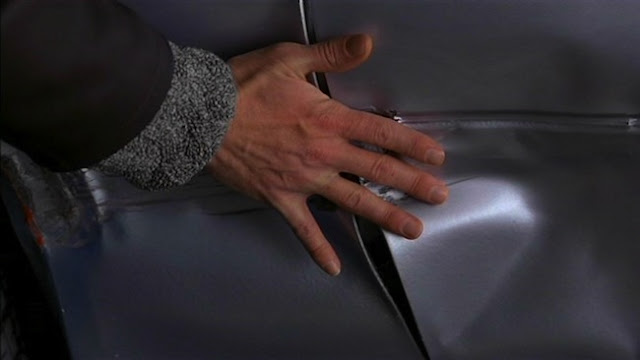Autoerotica: The glittering wreckage of "Crash"
David
Cronenberg's "Crash," winner of a jury prize for "audacity"
at last year's Cannes Film Festival, is a fine translation of the singular
character of J.G. Ballard's 1973 novel. In burnished, ornate, painfully
specific prose, Ballard suggests a linkage between sexuality and the modern
machine, between the unspeakable thrill of danger in our imaginative lives and
the deadly potential of the automobile and its propulsive motion. James Ballard
(James Spader) is a film producer whose dispassionate liaisons with his wife,
Catherine (Deborah Kara Unger), a sculpture-boned beauty, are heightened
through exchanging stories of their mutual, promiscuous adventures outside
their marriage. After an accident in which the other driver is killed, Ballard
meets the surviving passenger, Dr. Helen Remington (Holly Hunter), along with
Vaughn (Elias Koteas), a sexually polymorphous crash fanatic who has become
obsessed with the meeting of flesh and technology in what he believes can be
"benevolent psychopathology." Wreckage, physical scarring, sexual
encounters heightened by the proximity to danger—these are all esteemed. Yet
Cronenberg has managed to make a stunningly beautiful film, one of perversely
satisfying passion. Equal parts astonishing and horrifying, "Crash"
is concise, keenly imaginative and deeply, darkly satisfying.
The events of
the story begin thrillingly cold, with dialogue delivered in a hush of
exaltation, mimicking the just-plain-wrong whispers of the dreamer's brain.
While shooting in contemporary Toronto, Cronenberg has made a bit of timeless
futurism of his hometown, the wet, wintry landscape sere and depopulated, a
landscape emptied of all but forward motion.
Cronenberg's
uncompromised intelligence is preserved in its current, uncut NC-17 form,
despite the interference of Ted Turner, the Time Warner vice president and
former owner of distributor Fine Line features, who believes "Crash"
may persuade teenagers to have sex while crashing their cars. In fact,
Cronenberg's movie is an exquisitely calibrated metaphor for how fetish and
obsessive behavior exclude the outside world and occlude perception of the rest
of the world. "Are there more cars out there now?" the crash victims
ask one another. The world is divided into those who have crashed and those who
have not.
"The sex
at the beginning is pretty dispassionate but it starts to fill with
meaning," Cronenberg says, "which is really what they're looking for.
They've already got sex, and they've even got kinky sex, so it's not that
that's absent. It's meaning. Even though people think the movie is cold, I
don't think it's cold. It begins cold but it gradually fills with emotion. It
is subtle and it's not delivered the normal way it's delivered in movies."
Besides an unusual narrative structure—for instance, opening with three sex
scenes in a row that serve as characterization and plot—the characters are not
normal audience identification figures. " With obsessives, those who are
not obsessed are of no consequence," he says. "They're at best a
minor irritation. The only reason Catherine counts, even though she's not had a
crash, is that there is a desire there for them to reconnect and Ballard feels
he's found the key. But until she's had her crash, she can't be part of the
structure of the group or of him. She must find her crash." Without her
initiation, their shared experience is meaningless. She remains outside his
fantasy life. "It's absolutely faces in the crowd. People who you can't
quite see behind the wheel of cars are not the people you are concerned with.
There is a small circle of people who understand, the crash epiphany allows
them to relate to each other. Everyone else is irrelevant. That's what the movie
does as well. The rest of the world is just little shadows in the corners of
the frame."
Sensation
fills most of the frames. The mood and choice of details in "Crash"
is as heightened as foreplay—touch, tactile—not only sex, but the way
characters strain toward each other. "The whole movie is foreplay leading
to the final scene," Cronenberg says. "Even Vaughn tracking Catherine
with his car and touching her, nudging her car with his car is, in the context
of the movie, even more intimate, really, than physically touching her. It's a
real violation of the marriage."
Cronenberg's
unnerving film has met much criticism, including the plaint that a series of
sex scenes is not a plot.
He laughs.
"First of all, how limited one must be to make rules like that. And how
educated we have been into the Hollywood understanding of what narrative is and
how it should be delivered. My answer was, 'Why not? Why can't it be?' A
journalist said that the scariest thing about the movie was the lack of a moral
stance. That was, I felt, also very indicative of what one expects from a
Hollywood movie, but not necessarily what one expects from art. It was like a
plot device that was demanded had been excluded and he was outraged! `Well, I'm
glad you noticed,' I said, but it's really the subject of the film. There is no
moral stance that you can take. That is the subject of the film. And if I
impose my own artificial standards, then I'm completely spoiling my experiment,
which is to let these creatures have their head and try to reinvent all of
these things they're trying to reinvent. And I think that's the situation we
really all are in as humans, That's the existential contract that we signed on
birth, which we later look at and say, 'I can't believe I signed that!' That's
all these people are doing. They say, 'OK, reality, meaning, morality, all of
these things are our responsibility to invent and to force ourselves to believe
in.' And if we don't? They aren't there."
Originally published in a slightly different form in Newcity, March 20, 1997. The Criterion edition of "Crash" is available now.
Originally published in a slightly different form in Newcity, March 20, 1997. The Criterion edition of "Crash" is available now.
